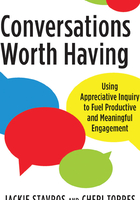
2 What Kind of Conversations Are You Having?
The moment of questioning is also the moment of choice, which holds the greatest leverage for effective action and positive change.
– Marilee Goldberg
Conversation is a constant in our lives, whether it consists of our internal dialogue or our interactions with people. We all know these conversations affect us, but we may not realize how much influence they have on our well-being and our capacity to thrive. Not sure about that? Have you ever been in a great mood and having a really good day when a short interaction with someone turned the whole thing sour? Or perhaps you were having a lousy day and a simple conversation suddenly brightened your outlook. In their research, Jeff and Laurie Ford, authors of The Four Conversations, actually documented that “the type of conversation you have with the people around you has a profound impact on your experiences, relationships, and accomplishments.”
Conversations are almost like breathing. Much of the time, we are unaware of the nature of our conversations and their impact on our experience of being in relationship and in the world. It usually takes a significant (emotional) experience for us to actually step back and reflect on the nature of those conversations. Recall Elizabeth’s passion and commitment to the bank and how she felt that those who bought the bank would destroy it. She made a lot of assumptions about what kind of conversation she was going to have in that first meeting. She was stunned when her assumptions turned out to be the opposite of what happened.
The nature of our conversations is far more important than we know. After she got into university, Ming Li, the daughter of one of our colleagues, told her mother that as a child she loved having conversations with her. “I felt connected with you. You empowered me to think and contribute, and those times always stimulated new ideas for me,” she said. “They also made both of us feel hopeful and excited about the future. I remember going to school after an early-morning conversation about innovation and renewable energy. I was so motivated by what might be possible! How I might one day contribute to that change.” Now, as a young adult, Ming is initiating those kinds of conversations with her friends and professors while earning a degree in environmental engineering.
So, what is it that creates the kinds of conversations worth having? Let’s find out by looking at the nature of conversations in general. Conversations have two dimensions: (1) appreciative-depreciative and (2) inquiry-statement, as shown in Table 2.1.
Table 2.1 The Nature of Conversations
